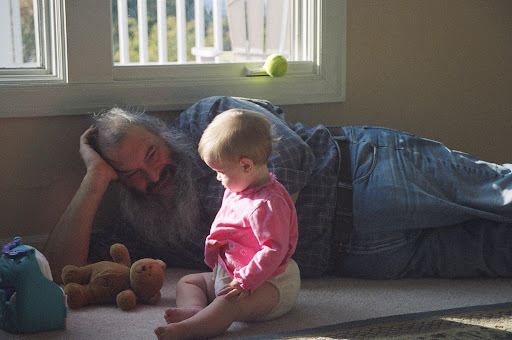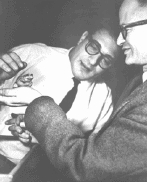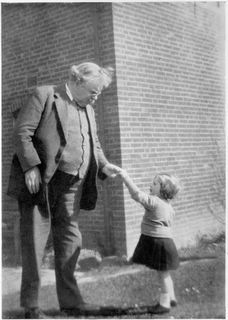It's a beautiful day today.
I spent the early morning on the back porch, sipping a cupful of lichee tea, the black cat sleeping like a puddle of shadow in the corner, the dog, Penny, is curled at my feet.
The backyard is a delight at this time of year. More so now since the lawnmower is in for repair and the lawn, which is usually a desert of crewcut, homogeneous green, has turned into a small meadow replete with clover, buttercups, hawkweed, daisies, and dandelions. I'll talk more about dandelions in a minute.
It's a small backyard, but it is full of delights. A high bush blueberry lost its blossoms a few weeks ago and is covered with green precursors to the feast that we'll share with the birds. A huge white pine blossomed this year and covered the porch and roof with a thick coat of dusty pollen. A rhubarb plant sits unharvested in the corner of a flower garden near the iris patch. California poppies with blossoms of white, pink and a particularly intense fluorescent orange that, in bright sunlight, hurts the eyes, sway in the light breeze dropping an occasional petal.
The violets have bloomed and gone by, so have the tiny white blossoms of the lungwort. Over by the fence are the sine-wave loops of the Egyptian onions. The clothesline stretches out across the yard and one of the white shirts I wear to work is waving contemptuously at my indolence. Nestled in the long grass beneath a partially deflated basketball, Penny's favorite plaything, lurks like an old joke (Oh, look at the orange Momma laid).
As I said ... it's a beautiful day.
It's Father's Day.
And it's as a father that I'd like to talk about dandelions.

I love dandelions! It makes me an outcast here in suburbia ... but I'll repeat it. I love dandelions.
I always have.
When I was a child, I enjoyed splitting the stems and threading them together to create golden crowns and garlands. I marveled at their ability to regenerate within a few days, at their transformation from golden blossoms to ethereal clocks of seeds that could be dispersed by a breeze or a puff of breath.
When I was older, I read Dandelion Wine by Ray Bradbury and lusted for a taste. When it finally came I was not disappointed. I ate dandelion greens in salad and boiled. I learned to roast the roots to make a kind of herbal coffee ... thereby also learning of the diuretic properties.
The dandelion seemed to be a perfect plant. When I first heard Michael Flanders and Donald Swann sing the praises of the "Wompom"
You can do such a lot with a Wompom,
You can use every part of it too.
For work or for pleasure,
It's a triumph, it's a treasure,
Oh there's nothing that a Wompom cannot do.
I immediately thought of dandelions.
Eventually I read the autobiography of G.K. Chesterton and laughed in recognition of his chapter-long paean to my favorite flower, and smiled at Henry Ward Beecher's comment that ...
“It gives one a sudden start in going down a barren, stony street, to see upon a narrow strip of grass, just within the iron fence, the radiant dandelion, shining in the grass, like a spark dropped from the sun”
More recently I was happy to find that the Japanese word "tampopo", which is also the name of an excellently funny movie, means dandelion.
But there is another reason that I like this flower. It resists. It persists. It prevails. It is a gift that we have been given, that, try as one might, cannot be returned or destroyed. Mow it down ... it will regrow almost overnight. Rip it up by the roots ... it will resurrect from the tiniest fragment left behind. Banish it from your lawn with chemicals ... it will find a crack in your driveway.
This tenacious blessing makes me think that it would be a far better symbol of democracy than the, comparatively, fragile bald eagle. Look how much work it is to bring back that delicate raptor from the brink of extinction. Has anyone ever suggested that the dandelion might become an endangered species?
And doesn't the dandelion grow just the way we would like to see democracy grow, springing up randomly, refusing to be eradicated, sending its roots deep and providing food, drink, beauty and happiness to even the poorest among us?
Why is it then, that as a culture, we hate the dandelion with a fervor that borders on madness? We dose our lawns with chemicals that we know can harm our children, we expend enormous energy and money to kill this beneficial blossom rather than rejoicing in its strength.
I think the answer lies in the fact that dandelions are out of our control. They will not be told where to go and where not to go. They pop their heads up inconveniently, spoiling the long dreary sameness of vast expanses of fallow land, and say "Here I am all different and ready to delight your eye." But we turn away in horror as we do from teenagers with purple hair and multiple piercings, and call for security to toss the interlopers out.
These horrid little yellow things are destroying our sense of sameness, our comfortable pablum-like existence. We want our green and useless lawn to be just that.
And I have to ask ... just as we try to kill off dandelions, aren't we doing the same to our children? Marginalizing the "troublemakers" the "artists" those that ask the difficult questions and refuse to accept rote answers. Why have we made such a religion of blandness, consistency, homogeneity and standardization?
From a society that was based on and valued the individual, the iconoclast, the rebel, the free-thinker, the genius, we have seemingly devolved into a bunch of obedient automatons who aspire to nothing more than to live in little boxes made of ticky-tacky that all look just the same. We view any ambition that cannot be measured by money with suspicion. We shrink from departures from the norm.
If we want flowers. we say, we'll plant them in rows and beds, in neatly spaced arrays to demonstrate our control. We want nothing to do with those damned self-reliant, self-sustaining, invasive weeds no matter how useful or beautiful they may be. They are an offense against us.
We say the same to our children. Stand there. Join a team. Be a member. Don't be different. Don't think for yourself. Memorize this. Don't ask questions. Fit in. Don't talk to those weeds over there or people will think you're one of them.
I started this rant because it's Father's Day ... and I'm a father. I'd like to think that I'm a good one. My kids are grown and on their own for the most part, but they know I love them and I know they love me.
I am proud of each of them, for each in his or her own way has found a path, their own path, not one dictated by society, and they have done well. They are beautiful, witty, interesting, and they think for themselves. They are competent, intelligent, strong and flexible.
I know them for what they are.
Dandelions!





 A brave and adventurous woman, she said:
"Better do a good deed near at home than go far away to burn incense."
"The most difficult thing is the decision to act, the rest is merely tenacity. The fears are paper tigers. You can do anything you decide to do. You can act to change and control your life; and the procedure, the process is its own reward."
“Anticipation, I suppose, sometimes exceeds realization.”
"Courage is the price that Life exacts for granting peace, The soul that knows it not, knows no release from little things."
"The more one does and sees and feels, the more one is able to do, and the more genuine may be one's appreciation of fundamental things like home, and love, and understanding companionship."
“The soul’s dominion? Each time we make a choice, we pay with courage to behold restless day and count it fair.”
"Never interrupt someone doing something you said couldn't be done."
"No kind action ever stops with itself. One kind action leads to another. Good example is followed. A single act of kindness throws out roots in all directions, and the roots spring up and make new trees. The greatest work that kindness does to others is that it makes them kind themselves."
"Adventure is worthwhile in itself."
"Never do things others can do and will do, if there are things others cannot do or will not do."
"The most effective way to do it, is to do it."
All of which are words that I hope my new grand-daughter
A brave and adventurous woman, she said:
"Better do a good deed near at home than go far away to burn incense."
"The most difficult thing is the decision to act, the rest is merely tenacity. The fears are paper tigers. You can do anything you decide to do. You can act to change and control your life; and the procedure, the process is its own reward."
“Anticipation, I suppose, sometimes exceeds realization.”
"Courage is the price that Life exacts for granting peace, The soul that knows it not, knows no release from little things."
"The more one does and sees and feels, the more one is able to do, and the more genuine may be one's appreciation of fundamental things like home, and love, and understanding companionship."
“The soul’s dominion? Each time we make a choice, we pay with courage to behold restless day and count it fair.”
"Never interrupt someone doing something you said couldn't be done."
"No kind action ever stops with itself. One kind action leads to another. Good example is followed. A single act of kindness throws out roots in all directions, and the roots spring up and make new trees. The greatest work that kindness does to others is that it makes them kind themselves."
"Adventure is worthwhile in itself."
"Never do things others can do and will do, if there are things others cannot do or will not do."
"The most effective way to do it, is to do it."
All of which are words that I hope my new grand-daughter 


